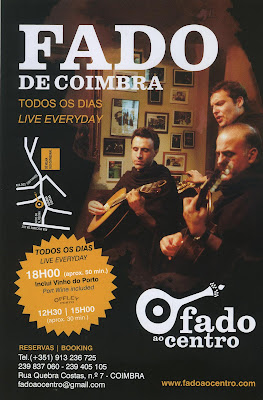Listen to Fado de Coimbra at Fado ao Centro

Last Monday I traveled to Coimbra. It's 50 km from where I live. A woman was handing out flyers and invited me to enter a new Coimbra's fado house. I was pleasantly surprised by the discovery. Fado ao Centro is a very nice place. I lived in Coimbra for several years and listen to fado several times but it never crosses my mind to hear fado of Coimbra at home. Why? What makes sense for me is to go out and see and hear fado in its own environment. Perhaps thinking of people like me, a group consisting of current or former students of Coimbra had the idea to create the Fado ao Centro, a space where people can listen to fado right in the middle of the historic city center and at very convenient times. Fado sessions occur during the day so even the older population more reluctant to leave home at night can go there and enjoy it. The room is cozy, with a sober but welcoming decoration. On one of its walls, there's a permanent exhibition on the history of fado and its interpreters, which can be visited for free. During fado sessions, the curtains of the windows are closed and the room plunged into darkness and that's typical of night serenades, recreating thus an intimate ambiance, the ideal setting to hear the song of Coimbra. The show at the final of the day also includes a taste of wine port. Visit the website of Fado ao Centro where you can listen to some fado and enjoy some photos of the performers.
Fado ao Centro is in the center of the city and Tricana woman statue.
Inside the room.
The spot where students play and sing.
Permanent exhibition on fado's history
It seems fado first appeared in Lisbon and Porto, being later taken to Coimbra. Some say that fado originated from Lundum, the music of the Brazilian slaves. Other say that students from Lisbon or from Brazil brought it to Coimbra where it gained new flavor and characteristics. Tunes sung by Provence troubadours in the Middle Ages are also pointed as a possible origin for this Portuguese typical and traditional song. Lisbon and Coimbra's fado are different. Fado of Coimbra has a lot of the student life feeling in it and men are the only ones who sing it. Coimbra's students wear a black suit and heavy black cape and that's how they sang it accompanied by classical guitar and a specially tuned Portuguese guitar. Students often sing about unrequited love or their student life memories. If a student boy is in love with a girl she might expect, even today, that he shows up serenading under her window.




Comments
Post a Comment
Thank you very much for visiting A Portuguese Love. Come back soon!